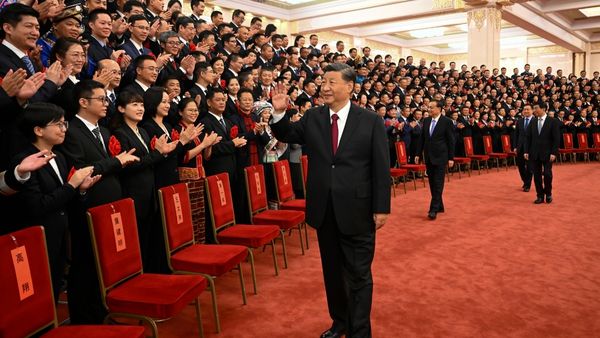China claims that it is defending its interests and responding to the West in kind when it uses tough diplomacy.

It is widely believed that Chinese President Xi Jinping will be re-elected to office after receiving support for a second term at the CCP’s 20th National Congress, which will get underway on Sunday, October 16.
China experienced a distinctive form of leadership under Xi, which is very different from that of other Chinese leaders in more recent memory.
Over the years, as China’s position in international affairs has changed, Xi has argued for a more aggressive strategy for managing problems on both the domestic and international fronts. Chinese diplomacy’s “wolf warrior” approach in particular, garnered interest.
What is meant by wolf warrior diplomacy?
“Wolf warrior diplomacy,” a term that became well-known, particularly after Xi was elected president, is a strategy used by the Chinese government to protect itself, challenge the West, and spread its ideology outside of its own country.
It is an informal name for the increasingly combative and aggressive communication style that Chinese diplomats have adopted during the past ten years.’Wolf Warrior’, also a 2015 Chinese action movie, and its follow-up were the term’s sources of inspiration.
The nationalist rhetoric and themes of the movies centre on Chinese fighters who frequently engage in combat with foreign mercenaries.
The word was intimately connected to Xi’s objectives, according to a Financial Times report dated 2020. According to a report by Steve Tsang, head of the SOAS China Institute in London, “Xi has stressed repeatedly that Chinese officials and diplomats must unsheathe swords to defend the dignity of China.” “The wolf warriors are merely responding to Xi’s call to battle.”

Why is wolf warrior diplomacy necessary?
The shift in approach has been linked to a variety of factors, including Xi’s more authoritarian tendencies than previous leaders, the deterioration of US-China relations under former US President Donald Trump, the accusations against China relating to the coronavirus outbreak, etc.
The shift in approach has been linked to a variety of factors, including Xi’s more authoritarian tendencies than previous leaders, the deterioration of US-China relations under former US President Donald Trump, the accusations against China relating to the coronavirus outbreak, etc.
Le explained that the term was a “misunderstanding of China’s diplomacy” at a conference held at a university, in Beijing. Further, he continued, “Now that they are approaching us, interfering in our family matters, persistently bugging us, insulting and discrediting us, we have no choice but to firmly defend our national interests and dignity.”
The main Chinese daily, People’s Daily, which is owned by the Communist Party, stated in a December 2020 article that “China’s diplomacy serves as the high duty of safeguarding the interests of the country and the people. China’s interests should not be compromised, and its dignity should not be humiliated.
And, that the fundamental tenet of Chinese diplomacy is that China must fiercely respond to any nation that violates its judicial sovereignty.”This will be the voice of justice in the eyes of the Chinese people,” it continued.
According to Hua Chunying, a spokesperson for China’s foreign ministry, “as long as we are fighting for China’s sovereignty, security, and development interests, as well as for national honour and dignity as well as for international fairness and justice,” she sees no issue with carrying the moniker of “Wolf Warrior.”
How does this actually appear?
On social media, Chinese officials are quick to refute any claims made by the West and deliberately initiate attacks, which serves as another example.
President Xi Jinping requested in June 2021 that the official media and diplomats of China portray a “credible, likeable, and respectable China” to the outside world.
When it comes to global public opinion, Xi was reported as stating, “It is vital to make friends, unite and win over the majority, and constantly expand the circle of friends.”
Related search: China behind the curtains: 200 years of legacy from poverty to progress













